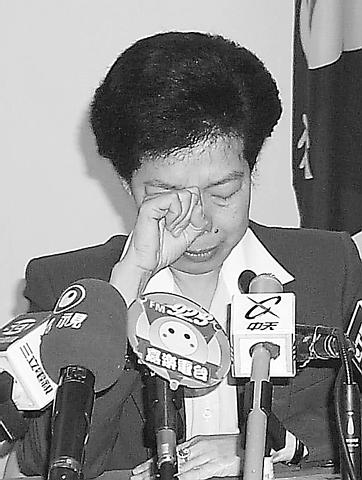Chiayi Mayor Chang Po-ya yesterday finally made official her acceptance of President-elect Chen Shui-Bian's (陳水扁) invitation to take up the post of Minister of the Interior, while serving concurrently as provincial chairperson.
Shedding tears during her announcement at the Chiayi City Hall yesterday, the incumbent mayor of the southern city said she was reluctant to leave the people in her hometown.
Chang said she had made the decision with a heavy heart, rather than with joy. She also said that the central government should not be superior to and aloof from local administration and people.

PHOTO: TSAI TSONG-HSUEN, LIBERTY TIMES
"This is an important factor for me in taking the post," she said.
"I hope that the opinions and needs of local communities can be brought to the central government, and that central authorities can pay serious attention to local development and construction. These situations are the same no matter where you are in Taiwan," Chang said.
Chang has served at Cabinet level before being the director-general of the Department of Health from 1990 to 1997, during which time she oversaw the difficult introduction of the National Health Insurance scheme.
Chang has served as mayor of Chiayi during three separate terms. First elected in 1983, Chang succeeding her mother, Hsu Shih-hsian (許世賢), after she died. She was re-elected once again in 1985, and then in 1997.
During those terms, her sister, current Taichung Mayor Chang Wen-ying (張文英), also served two terms.
In fact, the Chang family's political influence and popularity in Chiayi City have long been unrivalled.
Since Chang has served just over half of her four-year term as mayor,an acting mayor will be appointed by the central government to serve the rest of Chang's term which ends in 2001.
"It won't be my sister, though," Chang Po-ya said, smiling.
The search for a new Minister of the Interior after Chen's election has not been easy. Last week, Chen proposed that Chang take the post, and after what appeared to be great reluctance on her part, Chen paid a visit to Chiayi on Sunday to persuade her to change her mind.
In related news, Chen reportedly met last night with national security advisor Chien You-hsin (簡又新), who confirmed that Chen had asked him to serve as vice secretary-general of the Presidential Office.
Chien said he had yet to consider the offer, however, and that he had not made a decision on the matter.
Also, the appointment of Minister of Education remains undecided. Ovid Tzeng (曾志朗), president of National Yang Ming University, who has been named as a candidate, was not willing to make a firm commitment yesterday.

INVESTIGATION: The case is the latest instance of a DPP figure being implicated in an espionage network accused of allegedly leaking information to Chinese intelligence Democratic Progressive Party (DPP) member Ho Jen-chieh (何仁傑) was detained and held incommunicado yesterday on suspicion of spying for China during his tenure as assistant to then-minister of foreign affairs Joseph Wu (吳釗燮). The Taipei District Prosecutors’ Office said Ho was implicated during its investigation into alleged spying activities by former Presidential Office consultant Wu Shang-yu (吳尚雨). Prosecutors said there is reason to believe Ho breached the National Security Act (國家安全法) by leaking classified Ministry of Foreign Affairs information to Chinese intelligence. Following interrogation, prosecutors petitioned the Taipei District Court to detain Ho, citing concerns over potential collusion or tampering of evidence. The

Seventy percent of middle and elementary schools now conduct English classes entirely in English, the Ministry of Education said, as it encourages schools nationwide to adopt this practice Minister of Education (MOE) Cheng Ying-yao (鄭英耀) is scheduled to present a report on the government’s bilingual education policy to the Legislative Yuan’s Education and Culture Committee today. The report would outline strategies aimed at expanding access to education, reducing regional disparities and improving talent cultivation. Implementation of bilingual education policies has varied across local governments, occasionally drawing public criticism. For example, some schools have required teachers of non-English subjects to pass English proficiency

‘FORM OF PROTEST’: The German Institute Taipei said it was ‘shocked’ to see Nazi symbolism used in connection with political aims as it condemned the incident Sung Chien-liang (宋建樑), who led efforts to recall Democratic Progressive Party (DPP) Legislator Lee Kun-cheng (李坤城), was released on bail of NT$80,000 yesterday amid an outcry over a Nazi armband he wore to questioning the night before. Sung arrived at the New Taipei City District Prosecutors’ Office for questioning in a recall petition forgery case on Tuesday night wearing a red armband bearing a swastika, carrying a copy of Adolf Hitler’s Mein Kampf and giving a Nazi salute. Sung left the building at 1:15am without the armband and apparently covering the book with a coat. This is a serious international scandal and Chinese

NEGOTIATIONS: The US response to the countermeasures and plans Taiwan presented has been positive, including boosting procurement and investment, the president said Taiwan is included in the first group for trade negotiations with the US, President William Lai (賴清德) said yesterday, as he seeks to shield Taiwanese exporters from a 32 percent tariff. In Washington, US Trade Representative Jamieson Greer said in an interview on Fox News on Thursday that he would speak to his Taiwanese and Israeli counterparts yesterday about tariffs after holding a long discussion with the Vietnamese earlier. US President Donald Trump on Wednesday postponed punishing levies on multiple trade partners, including Taiwan, for three months after trillions of US dollars were wiped off global markets. He has maintained a 10 percent